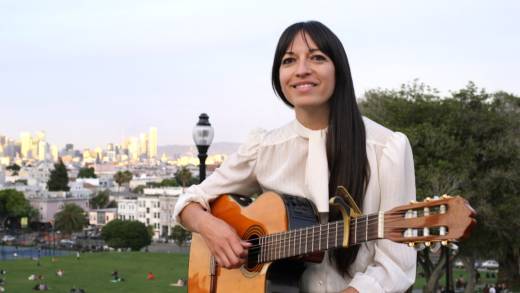Gameros actually wrote this song in 2011, during what she calls a time of great vulnerability. A dear aunt had died, and her hometown (where her parents, siblings and nephews still live) was going through militarization and drug cartel conflicts. She says her father, sister and brother all directly experienced violence within a short period of time. “All this happened while I was away in the United States, not able to travel outside the country. Being away from my family and my land in such hard times brought up a certain feeling of guilt, fear, powerlessness, doubt and I begin to question many things in life, in my own life.”
“¿Cómo Hacer?,” then, is “made up of questions that came up from my need for home, for family, for freedom, for wisdom, for forgiveness. How can we make life last? How can we dissolve borders? How can I make my land forgive me? How can I make her garden flourish again?”
Now, given the political climate in the United States, these questions have taken on new levels: “I see them as an invitation to reflect deeply on the actions that I could take toward making life on earth more meaningful and just for all; to reflect on the work I can do to break the borders that divide us as human beings; to pray harder so that I quickly shift from guilt and paralysis to positive action; to think of the steps I must take to see our land being born again and begin by planting new seeds and watering them and nourishing them,” says Gameros. “To know that just like in a garden, the work is never over and that seeing the fruits of this work takes time, and to always remember that the process doesn’t have to be painful, it can be beautiful if we keep our eyes on the prize, on the fruit, on the flowers that will bloom, on the knowledge that the work will pay off — perhaps not during our time, but for generations to come — and that our homelands will be what we envision them to be.”
Though Gameros says the Trump administration’s policies have not affected her directly yet, she’s nervous that immigration policies may change — and that the final document she’s waiting on, the piece of paper that will let her travel and play music outside the country, will be held up or never come at all. “Also,” she notes casually, “even though I already have proper documents to reside and work in this country, I am a bit nervous to travel by plane or get near immigration checkpoints.” She is wary of harassment, and understandably so.
If all goes as planned, though, she’ll be visiting Mexico next year for the first time in 15 years, a trip made all the more meaningful by the record she’s currently making at Women’s Audio Mission: an album of traditional Mexican tunes she learned as a child during family gatherings in her grandparents’ village, eight hours south of Ciudad Juárez. Her mother, Altagracia Estupiñan, appears on guest vocals.
“I’m incredibly excited about this album because it reconnects me with my roots,” says Gameros. “It’s an homage to life in the fields, an homage to family, to love, to nature. And it’s an offering to my homeland.”
Watch KQED Arts’ video on Diana Gameros from our Women to Watch series below.

Diana Gameros performs Thursday, March 30 at the New Parish in Oakland, opening for Gabby Moreno. Tickets ($25) and more info here.




